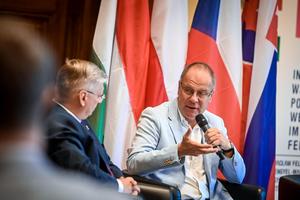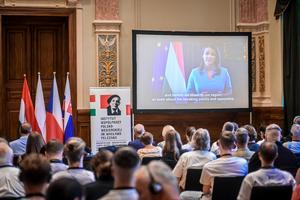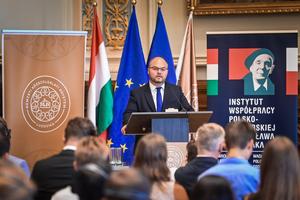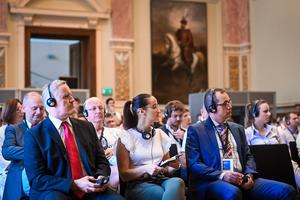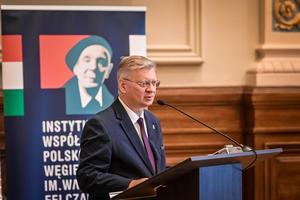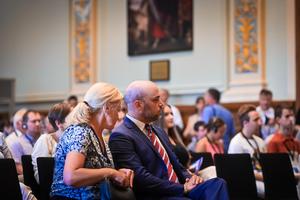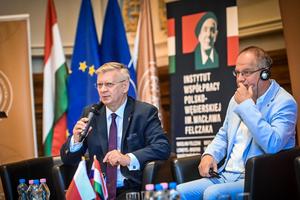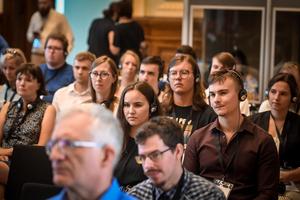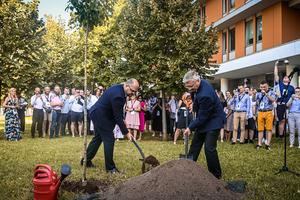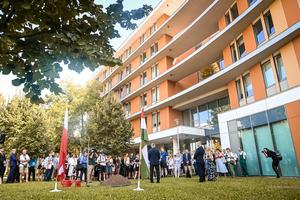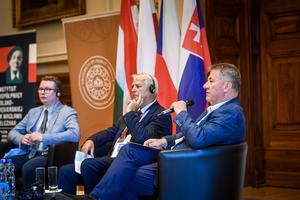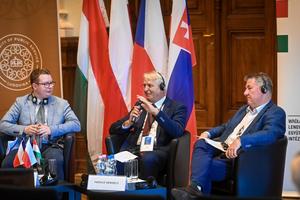The ceremonial opening of the Visegrád Summer Academy, organised jointly by the Ludovika University of Public Service (LUPS) and the Wacław Felczak Polish-Hungarian Cooperation Institute, took place on August 25th in the Grand Hall of LUPS.
During the event, it was highlighted that the Wacław Felczak Polish-Hungarian Cooperation Institute was established in 2018 at the initiative of Prime Ministers Orbán Viktor and Jarosław Kaczyński to promote Hungarian-Polish friendship, mutual development of relations between the two nations, as well as to support mutual understanding and enhance competitiveness. This year, in line with this spirit, marks the first edition of the Visegrád Summer Academy, held at LUPS Ludovika Campus and the Mathias Corvinus Collegium. Around a hundred Hungarian, Polish, Czech, and Slovak students are participating in the three-day event, with the international faculty consisting of distinguished scholars and high-ranking politicians dedicated to the Visegrád idea.
The President of Hungary greeted the participants with a video message. Katalin Novák expressed that the strong connection between our countries can only be long-lasting if the younger generation comprehends and experiences the role of the Visegrád states in today's world. They are learning about it and discovering what we share in common. "This is why I consider the role of the Felczak Institute very important and why I've been following its activities from the beginning. Events like this one offer young people the opportunity to exchange ideas about common values and differences and points of contention," said Katalin Novák. She added that as the country's first female President, she is pleased to see an increasing number of female participants in such programs.
The Visegrád Group's alliance addresses the role of intellectual capital, unique historical experiences, and the distinctive developmental path that will make the Central European region an economic engine of the continent. Poles and Hungarians have supported each other in difficult times, characterised by trust and mutual respect in their cooperation. The President believed that the ongoing war in our neighbourhood has not dramatically affected the relationship between the two countries, as both condemn Russian aggression and stand for Ukraine's territorial integrity, stability, and just peace. She expressed hope that shared historical connections would help overcome challenging times. "Let's unite our efforts to navigate our ship to a secure harbour," stated Katalin Novák.
Following this, Ákos Péter Mernyei, the International Director of LUPS, greeted the guests. "The Visegrád cooperation is about achieving results that we couldn't achieve separately or require much greater effort. As the current presidency of the V4, the Czech Minister of Foreign Affairs emphasised recently that we are countries belonging to a region with many common problems. “I would go even further: our destinies, both geographically and historically, economically and culturally, are intertwined," he articulated. He added that our youth ensure the future of our country, and events like the V4 Summer Academy connect the younger generation and provide an opportunity to nurture cross-border relationships.
Joining these thoughts, Maciej Szymanowski, the Director of the Felczak Institute, also highlighted the role of the youth. "After completing their studies, you will shape reality. Our states will become what you shape them to be," he stated.
The program continued with a panel discussion titled "Visegrád in the Shadow of War; Regional Cooperation Forms, Strategies, and Opportunities Between Geopolitical Blocs," featuring participants such as Marek Kuchciński, the Minister leading the Prime Minister's Office of Poland, online, and Tibor Navracsics, the Minister of Regional Development, in person. Marek Kuchciński discussed the economic consequences of war, increased armament, and physical border defence. He mentioned that the Visegrád Alliance achieved one of the world's most significant economic growths before the war, with a growth rate 2-3 times faster than Western Europe, serving as an essential partner for Germany and France.
Navracsics Tibor believes that understanding why these four countries began cooperating is the key to future success. He thought that the Hungarians were perhaps emotionally the most committed members of this alliance. Discussions concerning Russia show that although we think we know each other, a crisis of trust can arise. Hungary believes that Russia committed aggression and that peace must be achieved. Meanwhile, an economic power centre is emerging to our east, and the V4 states can play a vital role. Tibor Navracsics pointed out that timelines are essential, alluding to the development of medium-term cooperation between the East and the V4s. The Minister expressed concern that cooperation is progressing hesitantly in terms of institutionalisation. "However, if we want to be successful in strategic or policy matters in the EU, commitment needs to be deeper," he said, adding that he finds the biannual summit insufficient for discussing the problems affecting us. He emphasised that we must act if we take the V4 alliance seriously.
Next in the program, Ákos Mernyei and Maciej Szymanowski planted the Polish-Hungarian friendship tree in the Orczy Road College garden. “Gyula Illyés once said, 'In response to the challenges of the wind, the tree answers with its roots.' At Ludovika, we imagine a strong collaboration with deep roots that will stand the test of time and the trials of fate. The tree planting is a symbolic part of the Summer Academy program. It symbolises that just like our relationships, the Polish-Hungarian friendship, the tree also needs to be nurtured and cared for to grow," said Ákos Mernyei.
The program continued with a panel discussion titled "Visegrád – Bridges and Crossroads in the Past and Future," featuring Polish historian Wojciech Frazik, Czech representative Jan Hroudný, Slovak politician Ján Hudacký, and moderated by Gergely Prőhle, Director of the Institute for Strategic Studies at LUPS.
Wojciech Frazik outlined the historical background and reasons for the V4 alliance. He spoke about the image of the enemy that developed throughout history and the suspicion ingrained in the national subconscious. He pointed out that our task is to get to know and understand our neighbours’ cultures. Ján Hudacký emphasised the importance of how the older generation passes on information and motivates the youth. The development of historical and national identity derived from Christian roots needs to be improved in the new circumstances. He opined that we are destined to cooperate, but we should build on our natural values rather than derive values from new currents. Jan Hroudný recalled the well-known Czech writer Milan Kundera's essay "The Kidnapped West," in which Kundera writes that it has always been Eastern Europe's task to be Europe's condensed model and create diversity. The Soviet occupation took this away. After the regime change, the opportunity emerged again for East and West to collaborate, with our region as a bridge. He concluded that there were stronger and weaker moments of the V4 cooperation, but we, the youth, are optimistic.
Ján Hudacký noted about the region's role that it seems we have given up on our common roots, yet we must consider them more in these turbulent times. He emphasised that institutionalisation is essential to achieve rapid development and successfully compete with the West, strengthening economic cooperation, further developing the north-south infrastructure, and establishing an investment fund. Jan Hroudný agreed with this perspective: “We need to improve our economic performance by creating innovative companies; without these, we'll remain assembly plants for Germany”. Wojciech Frazik advocated for smart economic policies that harness synergies. The question is whether we decide how we will live regarding values and resources or relinquish them – he warned.
The program concluded with participants' visits to the MCC and the Parliament.
Text: Lilla Kovács
Photo: Dénes Szilágyi
